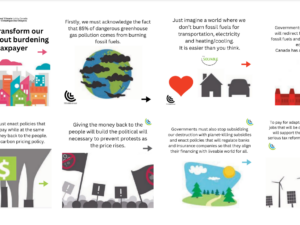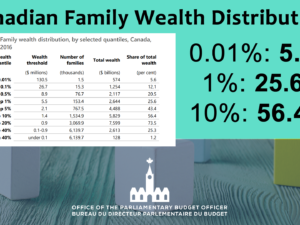About CCL Canada: Citizens’ Climate Lobby is a non- profit, non-partisan, grassroots advocacy organization creating the political will for a livable planet. Since September 2010, our volunteer members have been lobbying their MPs for a carbon fee and dividend proposal which includes the following clause: “All existing subsidies of fossil fuels including tax credits shall be phased out over the five years following enactment [of a carbon price].” Appreciation: We are thankful that Canadians now have a nationally-coordinated carbon pricing policy and have embarked in earnest on a 35-year transition towards creating an energy system that will be almost 100% fossil fuel free by 2050. We acknowledge that Canada’s long-term prosperity is dependent on the sustainable use of our natural resources. We understand that extraction industries see a need for preferential tax treatment to countervail their high capital requirements and long timescales. We appreciate recent actions to evolve these provisions: Prime Minister’s Mandate Letters: Natural Resources Minister Carr has been mandated to work with Finance Minister Morneau to: “explore opportunities to enhance existing tax measures to generate more clean technology investments and engage with provinces and territories to make Canada the world’s most competitive tax jurisdiction for investments in the research, development, and manufacturing of clean technology.” Finance Minister Morneau has also been mandated to: “fulfill our G20 commitment and phase out subsidies for the fossil fuel industry over the medium-term” This directly impacts Natural Resources Canada. Our key concerns: Canadians accepted some targeted subsidies as the necessary price of prosperity and good jobs in the past. However, future production of our fossil fuel reserves will be constrained by the world’s carbon budget, and continued subsidies will provide diminishing returns. It no longer makes sense to buttress the fossil fuel sector against the tide of history. There is an urgent need to reconsider the fossil fuel industry’s economic value chain in light of climate change. Negative taxes are artificially incentivizing companies to sink costs into infrastructure with dubious prospects. The costs of orphaned wells, tailing ponds, climate disruptions, and other externalities will be borne by future taxpayers long after fossil fuels have ceased to generate wealth. Climate change is a game changer. Support for outdated policies can carry opportunity costs as well. Without smart new policy to build markets, unlock private finance, and secure innovation, our nation’s clean-technology sector will quickly fall behind – according to a recent study by Analytica Advisors. Development of new reserves in the Arctic is particularly risky given the Arctic’s fragile ecosystem and the industry’s questionable capacity to clean up oil spills. We applaud the ban on new offshore permits but wonder about the risks from pre-existing permits and leases. Our Requests: We request a redoubling of efforts to eliminate subsidies to the fossil fuel industry: Available in pdf in English and French (May 2017) Sent in May 2017 to members of the Standing Committee on Natural Resources
OPEN LETTER: Our Request that the Standing Committee on Natural Resources Redouble Their Efforts to Eliminate Fossil Fuel Industry Subsidies
Home » CCL Canada News » OPEN LETTER: Our Request that the Standing Committee on Natural Resources Redouble Their Efforts to Eliminate Fossil Fuel Industry Subsidies
OPEN LETTER: Our Request that the Standing Committee on Natural Resources Redouble Their Efforts to Eliminate Fossil Fuel Industry Subsidies
Posted on September 22, 2017 in Open Letter












